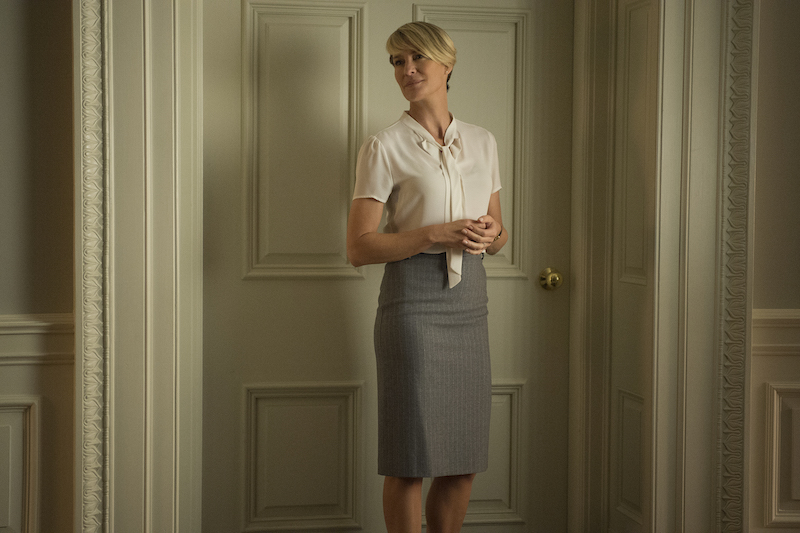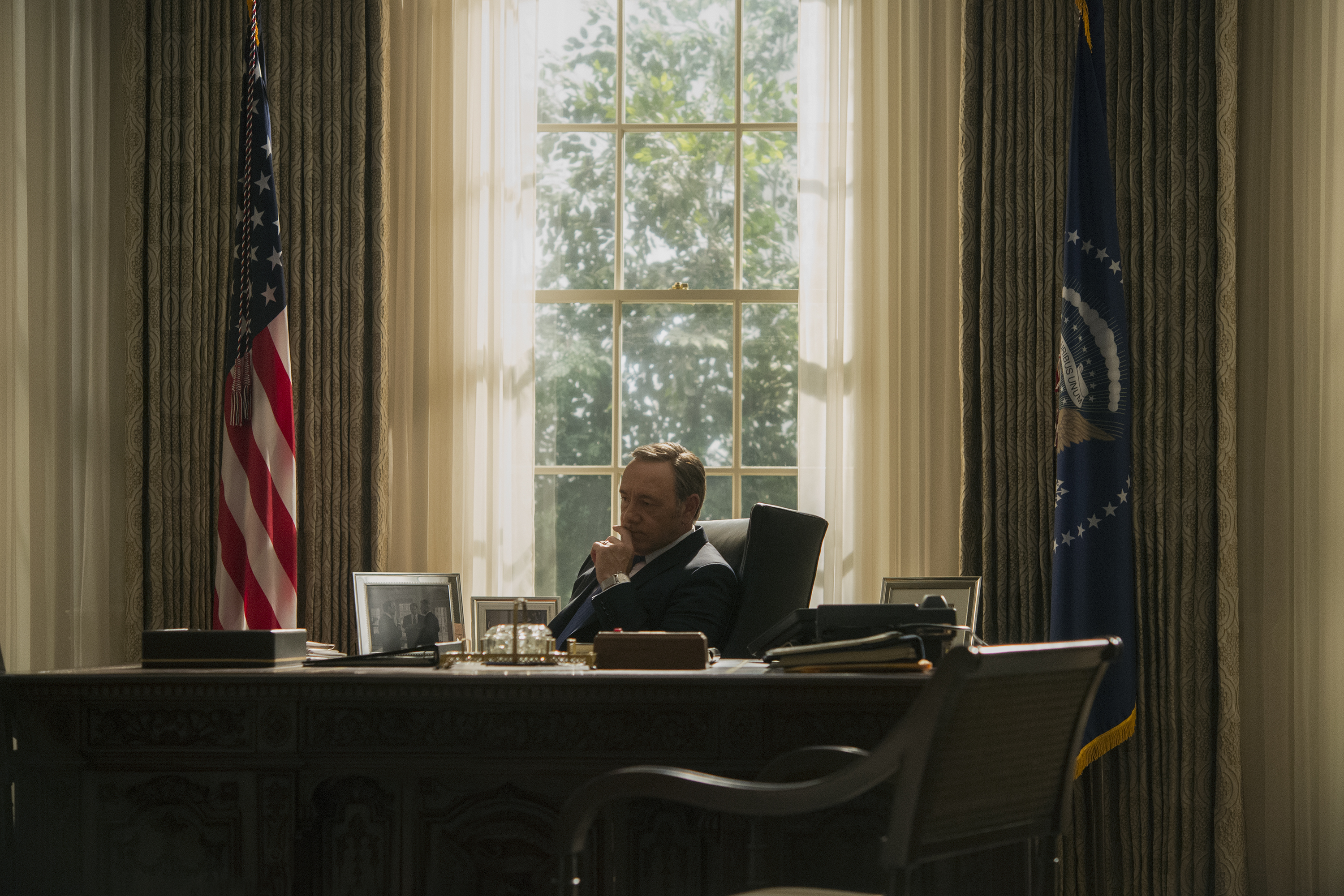By providing your information, you agree to our Terms of Use and our Privacy Policy. We use vendors that may also process your information to help provide our services. This site is protected by reCAPTCHA Enterprise and the Google Privacy Policy and Terms of Service apply.
Review: ‘House of Cards’ Season 3 Episode 2, ‘Chapter 28,’ Reverses Its Thinking


Morning Briefing
If anyone thought the Season 3 premiere was a bit slow, than Episode 2 was there to kick them in the keister. Beginning with Claire misspeaking at her interview for the UN position and ending with the First Lady throwing up in the sink, “Chapter 28” featured even more surprises in between.
The First Family found itself under attack from the get go: Claire was put on the defensive after being all-too-easily bullied by and then lashing out at Mendoza, the likely 2016 Republican Presidential candidate. She spent the rest of the episode trying to convince Senators of her viability for the position, and very nearly pulled it off. Yet despite her icy resolve, Claire lost the vote and spent a day recovering from the public humiliation (and personal defeat).
Frank, meanwhile, was informed he wouldn’t be the Democratic Party’s nominee due to low approval ratings and his own inaccessible demeanor. Unwilling to take no for an answer (like usual), Frank decided to go after the money in pursuit of power. Just like with Claire, his efforts were also for naught, as all of Frank’s cajoling phone calls amounted to not a single donation by night’s end. The pressures of the office finally broke him and Claire found her husband weeping in a ball next to his desk, an ominous light knocked over but still alight in the center of the room. Claire, still on a high from the progress made toiling for votes and unaware of her impending defeat, took the metaphorical dying light and f… fanned the flame back to full strength.
Revitalized with his faith restored, Frank returned to the office the following morning and spent the day coming up with a new plan of attack. Remy and Seth were his only two confidants — as Doug is still exiled while recovering — but it was a black egg handed to him by his defeated wife that sparked the President’s manipulative mind. He demands support for his America Works plan from the Democratic leadership and then goes on TV that very night to reaffirm his commitment to governing as well as confirm he won’t be running for President. To close things out, a revalidated or extremely concerned Claire (depending on your reading) asks Frank to name her the U.N. ambassador anyway, via a recess appointment. He agrees, and she throws up in the sink.
The David Fincher Shot
 Fincher is a director known for holding focus on his main characters’ reactions, rather than cutting away to less relevant expository statements. “Zodiac” is a good example of this, when tracking the terrified reactions to new bits of suspicious information takes center stage on multiple occasions. (Think of when the Zodiac calls in to the live TV broadcast, or when Jake Gyllenhaal’s Robert Graysmith learns a seemingly innocent man has a basement in his house, immediately making him a suspect).
Fincher is a director known for holding focus on his main characters’ reactions, rather than cutting away to less relevant expository statements. “Zodiac” is a good example of this, when tracking the terrified reactions to new bits of suspicious information takes center stage on multiple occasions. (Think of when the Zodiac calls in to the live TV broadcast, or when Jake Gyllenhaal’s Robert Graysmith learns a seemingly innocent man has a basement in his house, immediately making him a suspect).
Director John David Coles, who gave us a refrigerator shot in Episode 1, provides an example of another Fincher-like technique when he shows Frank’s reaction to being told he won’t be the Democratic Party’s nominee in 2016. The shot begins on Frank as he speaks positively and assertively about his plans, and it remains on his emotive face as the party members inform him of the bad news. It’s not just that he goes from happy to sad in the same shot. The key to the shot selection is in Frank’s eyes. They don’t dart from one speaker to the next as each contributes a line or two to the conversation. Instead, they move independently of who’s speaking, depicting Frank’s inner monologue. “Who’s doing is this and why now?” Which leads us to…
Breaking the Fourth Wall
Right after we watch Frank’s mental mechanics unfold, we’re told bluntly and directly those very thoughts we’d already picked up from the previous shot. “I suspected this was coming,” Frank says before expounding on the point. If the audience could speak back to him, I, for one, would say, “No shit.” Though later in the episode there was a funny bit using the expository device, (Frank’s angry confessional about how humiliating it was to “beg for money from some kid who was on Facebook before his testicles descended, but that’s—Derrick! Francis Underwood.”), it’s again proven irrelevant this week when Frank looks into the camera to tell us he just lied to the Democratic party about not running. Again, I say, “No shit.”
Binge and You’ll Miss It
 There wasn’t a lot to miss in this fast-paced and dramatically dense hour of television, but I will say this: If you can get a read on Seth, the former “new guy” turned presidential press secretary, you’ve got a Rust Cohle-level ability of understanding people. When asked to look in on Doug for the President, his emotional reaction is about as discernible as his five-word text messages. Just as much could be picked up from his visit over there, which was as dutiful as it was caring — meaning, what the heck does it mean? He was completely and utterly honest with Frank about Doug’s recovery status, but can he actually be the one honest man in Washington? Unlikely. My guess is he’s betting on Doug to destroy himself, as I’m sure Seth can tell the man’s going a bit stir crazy outside the office.
There wasn’t a lot to miss in this fast-paced and dramatically dense hour of television, but I will say this: If you can get a read on Seth, the former “new guy” turned presidential press secretary, you’ve got a Rust Cohle-level ability of understanding people. When asked to look in on Doug for the President, his emotional reaction is about as discernible as his five-word text messages. Just as much could be picked up from his visit over there, which was as dutiful as it was caring — meaning, what the heck does it mean? He was completely and utterly honest with Frank about Doug’s recovery status, but can he actually be the one honest man in Washington? Unlikely. My guess is he’s betting on Doug to destroy himself, as I’m sure Seth can tell the man’s going a bit stir crazy outside the office.
Made for Daytime
Remember how creepy and kind of cool Doug’s syringe full of whiskey was in “Chapter 27”? One chapter later and it’s already worn out its welcome. I can understand his need to limit himself to a specific amount of the addictive (and delicious) substance; a level below even what can be measured in a shot glass. Even his choice to use something that requires delicate motor skills is admirable, but I can’t help but find the practice needlessly excessive. Alcoholics have no limits. He’s on the wagon or he’s off it.
Ready for Primetime
I am absolutely in love with the First Family. Granted, it’s a family of two people who have always represented the best this series has to offer, but Frank and Claire’s relationship has reached a new level of intrigue after moving into White House. For a second, I thought sharing a peanut butter and jelly sandwich was going to replace their windowsill smoking sessions. Instead, it served as a reminder of their absence and a growing distance between these two power-hungry sociopaths. Both have slipped up in public this season: Frank on “The Colbert Report” in the season premiere and now Claire during her hearing. But it’s their reaction behind closed doors that’s so intriguing.
Easily the most memorable scene of the season so far came when Claire found Frank suffering from a bad case of the boo-hoo’s. She took in the situation quickly and reacted with shrewd effectiveness, literally raising him back to life (sorry, but there’s only so many ways to say it). But is Frank’s absence for Claire during her own time of need telling of their relationship? Has it become one-sided? Frank said he wanted to leave his own legacy last episode, and Claire corrected him to include her. Now Claire is solving her own problems as well as spurring Frank on to fix his own. Is their shared understanding still understood? Given Claire’s reaction at the end of “Chapter 28” — throwing up in the sink and then masking the smell with eggs — I’m lead to believe the answer is “no.”
Legacy Quote:
 “You are entitled to nothing.” – Frank Underwood
“You are entitled to nothing.” – Frank Underwood
Let’s just get this out of the way now: There’s no way any President would give the speech Frank did on live television and survive more than five minutes, politically-speaking. Both parties would abandon him, especially given the left’s pre-established distaste for the unelected president. You simply can’t say things like “The American dream has failed” or “Your children will not have a better life than you” and get past it. It’s somewhat humorous, if not intentionally ironic, that the First Lady was flogged for being misquoted while the President was at least tolerated if not hailed for the above statements.
Still, it made for great drama. Beau Willimon struck two very crucial chords in getting even the most critical viewer to go along with the presidential address: First was invoking the New Deal, a well-known and respected piece of American lore. Second was saying, “We must try something,” an idea most of America can rally behind in a time when Congress is refusing to do anything but block bills. We want to believe a speech like this could work even if we know it can’t and that’s what sold it. Speaking literally, this is a make or break move for Frank’s legacy. Either his plan — to court public appeal through governance to eventually win back the Democratic Party’s support for a presidential run — will work, or it will fail spectacularly. The most successful moments of the first two seasons came when Frank was scheming, plotting and taking big risks. Be it murder, crafty negotiating tactics or not-so-simple political moves, he’s been here before — and we’re very glad to see him back again.
Grade: A-
EPISODE 1 REVIEW: ‘House of Cards’ Season 3 Episode 1 ‘Chapter 27’
SEASON REVIEW: ‘House of Cards’ Season 3 Eases Up On the Sex, Amps Up the Politics — and Claire
By providing your information, you agree to our Terms of Use and our Privacy Policy. We use vendors that may also process your information to help provide our services. This site is protected by reCAPTCHA Enterprise and the Google Privacy Policy and Terms of Service apply.

















